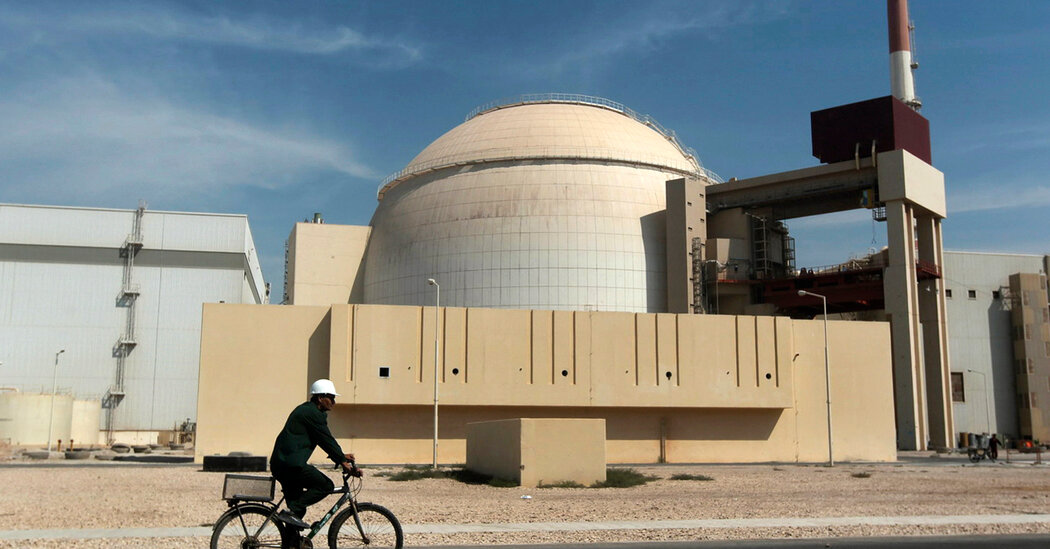
BRUSSELS — With negotiators all but finished with their work to restore the 2015 nuclear deal with Iran, the Russian invasion of Ukraine has made an agreement both more urgent and more difficult to get.
Western governments, intent on punishing Russia for the attack, have said they want to wean themselves from Russian oil, which has kept generating revenue for the country even as economic sanctions kick in.
But to isolate Russia and still keep oil flowing, the West would lift the restrictions now in place on Iranian oil sales as part of a revived nuclear deal, and Moscow just put up a hurdle that some fear may scuttle any agreement.
Even before that there remained three or four outstanding issues between Iran and the United States that entail difficult political decisions for both sides regarding the scope of remaining sanctions on Iran, senior European and U.S. officials say.
The deal would sharply restrict Iran’s nuclear program and allow it to sell its oil freely on the world market at a critical moment when the war in Ukraine has threatened supplies. But to get there, the Iranians are insisting that President Biden lift one of the terrorism designations of the Islamic Revolutionary Guards Corps, senior European officials say.
The corps was declared a “foreign terrorist organization” by the United States in April 2019, nearly a year after President Donald J. Trump pulled out of the Iran deal, and any removal of that designation would face sharp criticism in Congress.
Then on Saturday, Russia added a new complication when its foreign minister, Sergey V. Lavrov, demanded assurances from the United States that the Western sanctions imposed on Russia over the war not interfere with Russia’s future trade with Iran.
Mr. Lavrov said he wanted a written guarantee that sanctions ‘‘launched by the U.S. will not in any way harm our right to free, fully fledged trade and economic and investment cooperation and military-technical cooperation with Iran.”
Following a call between Mr. Lavrov and his Iranian counterpart, Hossein Amir-Abdollahian, Russia said a restored nuclear deal must “ensure that all its participants have equal rights” to develop “cooperation in all areas” with Iran.
There is concern that Russia, a signatory to the nuclear deal, may see an opportunity to put a hole into the sanctions against it, and the United States quickly dismissed its demands.
The sanctions imposed after the invasion, said Secretary of State Antony J. Blinken, “have nothing to do with the Iran nuclear deal.” He said they “just are not in any way linked together, so I think that’s irrelevant.”
With Iran believed to be only several weeks away from enriching enough uranium to create a nuclear bomb — though weaponizing it would take much longer — a revived deal is considered more important than ever.
Iran has regularly denied intending to build a nuclear weapon, but it has enriched uranium to 60 percent, a level that has no civilian use, and has created uranium metal that would be required to build a bomb.
Should an agreement on reviving the deal be reached and Iranian oil brought back onto the market, it would be an important signal to Moscow that global dependence on Russian energy may be diminishing.
Iran can produce more than two million barrels of oil a day, and if these supplies were able to reach the markets, the surge in prices would be slowed.
But implementation, or reimplementation, of any deal would take several months, perhaps until June. Sanctions would first need to be lifted, and Iran would have to export its excess uranium and then seal away the many advanced centrifuges that violate the terms of the deal.
Criticism of a new deal has mounted in Congress. Under a law passed in 2015, when the original deal was signed, Congress has the right to review any new agreement, and the Senate minority leader, Mitch McConnell, Republican of Kentucky, has called for “major hearings.” But even if Congress voted to disapprove it, it is doubtful that opponents could muster the two-thirds majority in both houses needed to override a presidential veto.
Negotiators believed they were close enough to finishing that there were plans to sign the deal on both Saturday and Sunday. They were postponed, and the key negotiators returned to their capitals.
In a statement on Tuesday, Britain, France and Germany urged completion.
“The window of opportunity is closing,” they said. “We call on all sides to make the decisions necessary to close this deal now, and on Russia not to add extraneous conditions to its conclusion.’’
But Russia is now a new unknown, and its intentions are not yet clear.
If Russia wants guarantees limited to its obligations under the nuclear deal, that can be managed, officials say. If the Russian demand is broader, and includes exemptions from Western financial and trade sanctions, the deal could quickly die.
Iran, which wants the deal done and the removal of the tough economic sanctions the United States has imposed on it, criticized the new Russian demands. Mr. Amir-Abdollahian told Iranian media on Monday that Iran “will not allow any external factor to impact the national interests for removal of the sanctions.”
While Russia is a member of the pact — the United States withdrew in May 2018, and these negotiations have been to get Washington and Tehran back into compliance with the accord — Moscow’s approval may not be legally necessary. But China and Iran may not want to proceed without it, and Russia remains a member of the commission that oversees compliance.
Russia-Ukraine War: Key Things to Know
The new deal envisions Russia taking Iran’s large stock of highly enriched uranium in excess of the deal’s limits, and it is not clear, officials say, whether any other country is ready to do the same. Britain and France are both signatories and both nuclear states, so in principle they could take the uranium; the important thing is to get it out of Iran.
If in the end, after 11 months of painful negotiations, there is no deal, European officials fear more instability in the Gulf and a new race among other countries to build their own nuclear weapons.
Traveling in Estonia on Tuesday, Mr. Blinken said he did not expect Russia to obstruct progress in the Iran nuclear negotiations.
“We continue to work to see if we can come back to mutual compliance with Iran on the deal,” Mr. Blinken said. “Russia continues to be engaged in those efforts. And it has its own interests in ensuring that Iran is not able to acquire a nuclear weapon.”
The deal as negotiated does not include follow-on talks on Iran’s missile program, regional activities or even its nuclear program, the officials say, which were original goals of Mr. Biden.
There are also separate and highly sensitive negotiations taking place with Iran over the return of Americans being held there.
The U.S. envoy to Iran, Robert Malley, has suggested that securing the nuclear pact is unlikely unless Tehran frees four U.S. citizens, including an Iranian-American father and son, Baquer and Siamak Namazi, whom Washington says Tehran is holding hostage. But Mr. Malley has always insisted that the negotiation over the citizens is separate from the nuclear talks.
Another complication was lifted by an agreement over the weekend with Iran by the head of the International Atomic Energy Agency, Rafael M. Grossi, on a three-month plan for Iran to finally answer outstanding questions about possible past military activities stemming from unexplained particles of uranium found at three old but undeclared sites.
If the deal is finally done, the plan is for a ministerial meeting of the joint commission of the deal among its current members — Iran, China, Russia, Britain, France, Germany and the European Union.
Mr. Blinken would send a letter confirming American agreement to re-enter the pact. Mr. Amir-Abdollahian and Josep Borrell Fontelles, the European Union foreign-policy chief, would attend in person; others would attend virtually.
It is unclear whether Mr. Lavrov would want to attend in person.
David Sanger contributed reporting in Washington; Lara Jakes in Paris and Farnaz Fassihi in New York.




